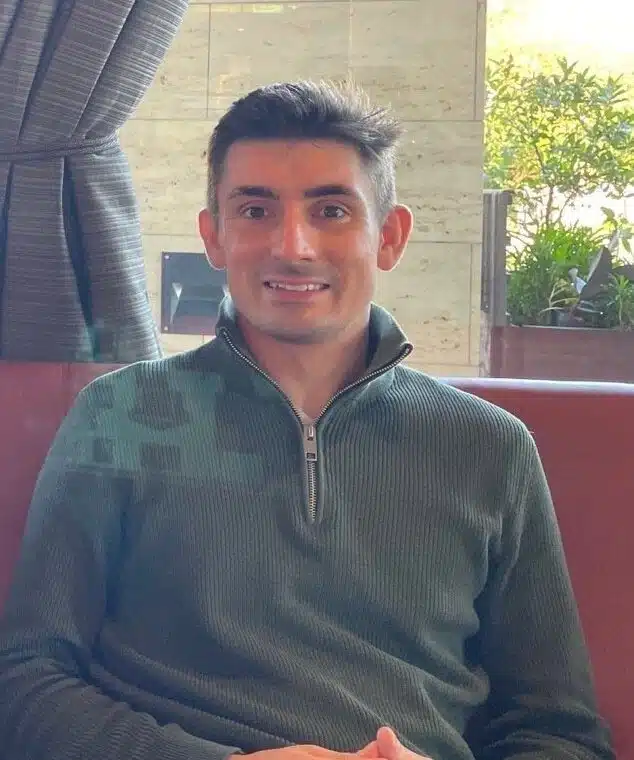Mark shares how words have helped him rebuild his confidence.
I’ve had eczema for as long as I can remember. My mum tells me I was diagnosed before I was one. As a little child, I don’t remember much about it, but I remember a lot as a teenager. I remember the Diprobase and the hydrocortisone. I was in pain and scratched and my skin bled and wept. I knew I wasn’t like everyone else as I’d have to plan my day around when I needed to put on cream.
But most of all, I remember how I was made to feel – the stares, the comments and the questions about my eczema. It was these that hurt the most.
When you’re a teenage lad, the very last thing you need is to be ashamed of your appearance. It’s a time when you start caring about how you look, the clothes you wear and having the latest trendy hairstyle.
But when your skin – in my case, on my face and neck – is red, dry and weeping, fashion and looking cool fades into insignificance. You’re already self-conscious enough as it is, without eczema, and especially without the comments about eczema. No, it’s not that I’m unhygienic. No, it’s not contagious. No, it’s not solvable just by trying to ‘stop scratching’. And no, I haven’t got a tan.
But when your skin – in my case, on my face and neck – is red, dry and weeping, fashion and looking cool fades into insignificance.
Mark
At the time, I just wanted to hide and escape it all. They were dark days.
Secondary school is not a fun place to suffer eczema. In my later teenage years, my confidence was shot. I barely wanted to leave the house because I felt so bad. I was ashamed of what my skin looked like. No one should feel that way, but many eczema sufferers do.
Looking back now, I can fully appreciate how much those comments hurt me and how much they reduced my self-esteem and confidence. It knocked me back for years. I was simply trying to survive. My mood and confidence would oscillate with my eczema flare-ups and the comments that followed.
It’s not like that anymore. I can now look back and smile, almost wryly, and admire the resilience it taught me. From school to university to getting a job, handling the comments got easier.
Throughout my life, I’ve had bad times and good times with my skin. That’s unchanged. What’s different is how I’m able to handle it. Before, a comment would pierce my skin deeper than any scratch and make me feel worthless. Now, I respond calmly, honestly and openly. The comments don’t come from a place of malice.
Often, people are genuinely trying to help: ‘Have you tried this cream?’ or ‘You just need to identify the triggers.’ Now I calmly respond, ‘Yes, it’s eczema and I work with my dermatologist to get the appropriate treatment.’
What changed? What’s the difference between the teenage me and the adult me? It all started with a few words that will stay with me forever: ‘Mark, those who mind don’t matter and those who matter don’t mind.’ True friends and family, they’ll support you and never dream of saying something hurtful. And anyone who does say something hurtful, well, they don’t matter.
The comments, though we try to bury and ignore them, hurt us. But I’ve learnt that if you have eczema, it’s not only about surviving. I’ve learnt that you can live a thriving, thrilling, fulfilling life. Nothing is stopping us from achieving our full potential.
One of the proudest moments in my life was when I moved for work and I played football with some colleagues. I proudly wore shorts and a short-sleeved T-shirt. For many years, I’d worn long-sleeved shirts and trousers to cover myself up, even in the baking heat and the sun. I didn’t want anyone to notice my skin. But on that day, walking on to that football pitch, I was comfortable in my body. No one else knew it – they were more interested in scoring goals and winning the game – but I’d already won.

Although I still suffer from eczema, and I still have to pop to the bathroom to put on cream at work, it no longer defines me. I’ve swapped the Diprobase for Hydromol. I’ve swapped the hydrocortisone for Elocon. But most of all, I’ve swapped the shame of eczema with the pride of being who I am. I have the confidence and the support network to be strong in the knowledge that if someone says something unpleasant about my skin, I can deal with it.
I’ve been lucky enough to have good jobs, to present in front of hundreds of people and to travel to some far-flung places. When I was 17, I was a million miles from this. If you ever feel down about your eczema and what people say about it, know that you will get through it. Just like when I wore a short-sleeved T-shirt and shorts to play football, sometimes the wins we’re most proud of are the ones deeply personal to us.
The brutal impact of eczema on self-esteem and confidence, especially for young people, is underappreciated. But just as one voice can harm a person’s confidence, another can build confidence. Even now, if someone says something about my eczema, I say to myself: ‘Those who mind don’t matter and those who matter don’t mind’.

